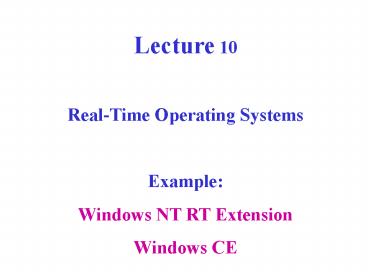RealTime Operating Systems - PowerPoint PPT Presentation
1 / 86
Title:
RealTime Operating Systems
Description:
Most moderate and complex RT systems have RTOS. Some functions of RTOS are similar to normal OS: ... the specified transport mechanism. 5. Transport mechanism ... – PowerPoint PPT presentation
Number of Views:55
Avg rating:3.0/5.0
Title: RealTime Operating Systems
1
Lecture 10 Real-Time Operating Systems Example
Windows NT RT Extension Windows CE
2
- Real-Time Operating System (RTOS)
- Most moderate and complex RT systems have RTOS.
- Some functions of RTOS are similar to normal OS
- -Managing interfaces to the low-level hardware.
- - Scheduling and preempting tasks.
- -Memory management.
- -Providing common services I/O, standard
devices(keyboard, printer) . - Some functions of RTOS differ
- -Scaleability.
- -Scheduling policies and synchronization methods.
- -Support for embedded, diskless target
environment. - -RTOS is tailored and optimized for embedded
systems. - -RTOS provides the ability to boot from ROM.
- -Many RTOS can operate from ROM.
3
- Scaleability
- RTOS is structured so that only the needed
components are included in the RTOS image
executing on the target. - Kernelthe innermost core, provides the most
essential features of the RTOS. - Other features are added as necessary.
- Scaleability makes RTOS widely applicable to
small, single-processor applications and to
large, distrubuted ones. - RTOS vendors call this microkernal architecture,
emphasizing the small size of the minimalist
kernel.
4
- Scheduling
- RTOS most commonly provide priority-based
preemption for control of scheduling. - The higher priority task always preempts the
lower-priority tasks when the former becomes
ready. - Average performance is a secondary concern.
- The primary concern is that system meet all
computational deadlines, even in the absolute
worst case.
5
- Typical RTOS features
- Hardware independence
- Scaleable architecture
- Resource management (Memory Allocation)
- Concurrent management
- Data-access control and protection
- Time management
- Networking
- I/O services and file systems
- High-level language support libraries
- Graphics tools
6
Real-Time Operating System (RTOS)
7
(No Transcript)
8
(No Transcript)
9
(No Transcript)
10
(No Transcript)
11
(No Transcript)
12
(No Transcript)
13
(No Transcript)
14
(No Transcript)
15
(No Transcript)
16
(No Transcript)
17
(No Transcript)
18
(No Transcript)
19
(No Transcript)
20
(No Transcript)
21
(No Transcript)
22
(No Transcript)
23
(No Transcript)
24
- RT Kernel
- Provides deterministic scheduling and execution
of RT threads within RT processes. - 2. Real-time application, C and C libraries
- Gives direct access to the RT kernel services for
RT threads - 3. NTX library
- provides RT extensions for the Win32 API that
allow Windows NT threads to communicate and
exchange data with RT threads within the
application. - 4. Transport driver
- A driver that converts information to the
protocol needed by the specified transport
mechanism
25
5. Transport mechanism The communication protocol
or method used by NTX to communicate between
Windows NT and RT threads. Whether the various
portions of your INTime applications reside on a
single PC, or on multiple computers accessed vie
serial or Ethernet cable, NTX provides this
essential communication. 6. Modified Windows NT
hardware abstraction layer(HAL) A special
version of the Windows NT HAL that improves the
overall reliability and robustness of an INTime
node, allowing RT threads to continue executing
properly even if Windows NT crashes.
26
(No Transcript)
27
(No Transcript)
28
(No Transcript)
29
(No Transcript)
30
(No Transcript)
31
(No Transcript)
32
(No Transcript)
33
(No Transcript)
34
(No Transcript)
35
(No Transcript)
36
(No Transcript)
37
(No Transcript)
38
(No Transcript)
39
(No Transcript)
40
(No Transcript)
41
(No Transcript)
42
(No Transcript)
43
(No Transcript)
44
(No Transcript)
45
(No Transcript)
46
(No Transcript)
47
(No Transcript)
48
(No Transcript)
49
(No Transcript)
50
(No Transcript)
51
(No Transcript)
52
(No Transcript)
53
(No Transcript)
54
(No Transcript)
55
(No Transcript)
56
(No Transcript)
57
(No Transcript)
58
(No Transcript)
59
(No Transcript)
60
(No Transcript)
61
(No Transcript)
62
(No Transcript)
63
(No Transcript)
64
(No Transcript)
65
(No Transcript)
66
(No Transcript)
67
(No Transcript)
68
(No Transcript)
69
(No Transcript)
70
(No Transcript)
71
(No Transcript)
72
(No Transcript)
73
(No Transcript)
74
(No Transcript)
75
(No Transcript)
76
(No Transcript)
77
(No Transcript)
78
(No Transcript)
79
(No Transcript)
80
(No Transcript)
81
(No Transcript)
82
(No Transcript)
83
(No Transcript)
84
(No Transcript)
85
(No Transcript)
86
(No Transcript)































